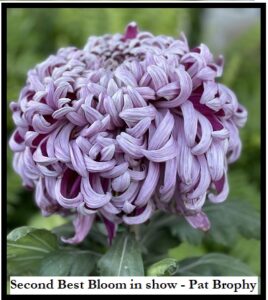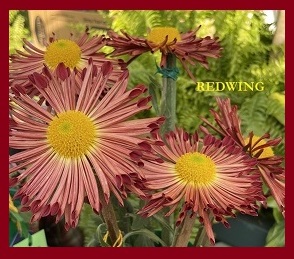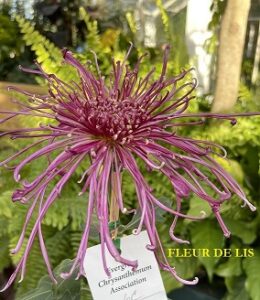Ed note: So how did your mums do this past year? This is a great time to review 2018 and make plans for 2019. What cultivars did you like or not like? Did they stall? Too Hot? Too cold? Talk to your coach or bring your questions to the December meeting.
-Cultural Notes for December- drs, 12/06/2013
Success for the following year begins with the care of our stock to produce the quality cuttings for next year. The Nov. Newsletter outlined the basic approach for care of our stock after blooming and emphasized special procedures for preventing further propagation of “White Rust” as well as getting the stools ready for talking cuttings in 2014.
Now we must build on that in several ways as follows: 1) Continued care of stools through dormant period. 2) Breaking out of the dormant period and producing cuttings, and 3) Taking early cuttings. Also we’ll provide some helpful note s along the way.
T0-Do’s
+Continue White Rust program from the November. Newsletter. i.e. spraying dormant stools 3 times between mid November and early January with Eagle or Immunox Fungicides, supplemented by Daconil in some instances. We will have more Eagle fungicide to distribute at the Dec. meeting. (ED Note: Did anyone have White Rust issues this past year?)
+Prepare your stools for Next year’s cuttings :
– Keep the stools outside, protected from cold, wind , rain and slugs. It is important for the plant to chill and remain dry and dormant until 2-4 weeks prior to taking cuttings. This chilling period will produce much stronger cuttings for the next growing cycle. Most plants can withstand one or two nights of freezing, down to 28 deg. but 3 or more consecutive nights freezing will probably kill all but the hardiest of your mums. During severe colder snaps, a garage, greenhouse, shed or tarp can be used temporarily to protect your plants until the cold snap subsides.
-Two to four weeks before the desired cutting- time, bring the stools into a heated area (60 deg. for example) and feed with a dose of high Nitrogen fertilizer such as Miracle grow to stimulate new growth.
For me this translates to moving in and heating the old stools to mid Dec. as I will be starting with new cuttings in mid to late January.
+Clean up and re-fill your cutting beds:
Every 3-4 years it is good practice to clean out your old cutting beds, Spray all the structure and mats with a fungicide and refill with fresh new cutting media. Since we are on a kick this year to eradicate White rust this would be a good time to do the complete refreshing of your beds. Even If you are now starting directly in 2 ½ in cross bottom pots, or other newer pellets You are probably placing the new potted cuttings on top of your old cutting bed so it’s still necessary to clean it up.
I now recommend a starting bed media of 50% Green Mountain sharp white sand and 50% Pro-Earth #2 starting mix. The Green Mountain sand comes from crushed stone and has sharp edges and corners. The sharp edges tend to penetrate the cambium layer along the imbedded stem, which promotes development of many more roots on the cutting. The Pro Earth medium is a bit finer than the M&R mix, contains more basic fertilizer combined with some longer term slow- release fertilizer, and a basic dose of trace elements. I’ll try to have some M&R mix and a bag of Pro Earth #2 at the Dec. meeting.
+Some Old Basics:
-Cutting beds need heat cables or pads and means to hold the Temp. between 65 deg and 69 deg F.
-Some rigid foam insulation under the cutting cables or pads will help maintain the heat.
-The cutting media should be approximately 3” deep.
-Cutting bed size should be selected so that the bed can accommodate one or more of the standard trays of 11”x22”. Mats generally will come in sizes that approximate multiples of the tray size.
-An overhead fluorescent light Is generally required. A 2 bulb 4ft shop light works well. You can buy special gro-lux or plant-gro bulbs but they are relatively expensive and plain old white light bulbs are still very effective.
If you want help designing or building a cutting bed, talk to Ronnie or Mark.
Don Stark’s top Dozen List for 2013
Based on cultivars that have produced well in the last 3 years, here’s my top list of cultivars for classes 1 through 15. All are grown by ECA members and can mostly be found at the plant sales.
1. Connie Mayhew- A creamy yellow #5 or #2 that everyone should grow. It has won, Best Bloom -Open Classes (Ron Elliott, 2011), Best#2, Best vase of 5-(Mike Kubo) etc. It’s been a staple in the club for more than 40 years.
2. Lundy & Yellow Lundy – Now the class of the #2s. They are big long lasting reflex blooms and you’ll love the yellow and brilliant white. Steve Joyner’s Lundy was best in show in 2012.
3. Seychelles-A dark pink #2 Reflex that is big, has great form and likes lots of fertilizer. A must have for the Medium Challenge. Don Stark won best in show with it in 2008.
4. Alexis & Apricot Alexis-Varieties you’ll love to grow. A staple in the Decorative Challenge.
5. Gigantics are back again! Big in the #1 class, with new stock from England. Regular winners.
6. Fairweather Family-The best group of #3s in our collection. Fills up the Incurved Challenge, wins best Incurve, best vase of 3 regularly. Colors: Pink, White, Primrose, Peach, White and Salmon
7. Harry Gee Family- The Gees are back with some great new stock from England. Chris Brookes won Best in show with Amber H. Gee in 2011. It,s a medium to large #1 reflex with nice smooth form. Perhaps the easiest #1 to grow and blooms early enough to always be available for the show.
8. Vienna Waltz- Spider (#10 PU) Long time, one of the best spiders in the club. If you want to grow Frilly-Dillys you should have this one. Easy to grow, somewhat heavy feeder and large strong blooms.
9. Lava- A new #10 Spoon, bronze/Yellow. Grows strong, puts out strikingly intense yellow to Bronze blooms with very long healthy petals. Bob Ewing Swamped the #10 classes with it a couple of years ago and Stark did the same in 2012. You will really like this one!
10. White City- #14 A white reflexing intermediate that grows very well for lots of us. Good for use in Late Dec. and/or Early English Challenges.
11. First Light- #6 Pink cushion, grows profusely in pot or garden and Puts out a plethora of of large perfectly formed cushion blooms. Centers tend to be perfectly domed and the Whitish florets are uniform and flat.
12. Lancashire Fold- Large perfect form #1 Purple. This one’s a little more difficult to grow but worth a try. It’s a moderate to light feeder and likes to be ignored. If you just keep it growing easily and resist the urge to push you just might win “Best in Show”. It is one of the most beautiful blooms we have.
DRS 11/29/2012




